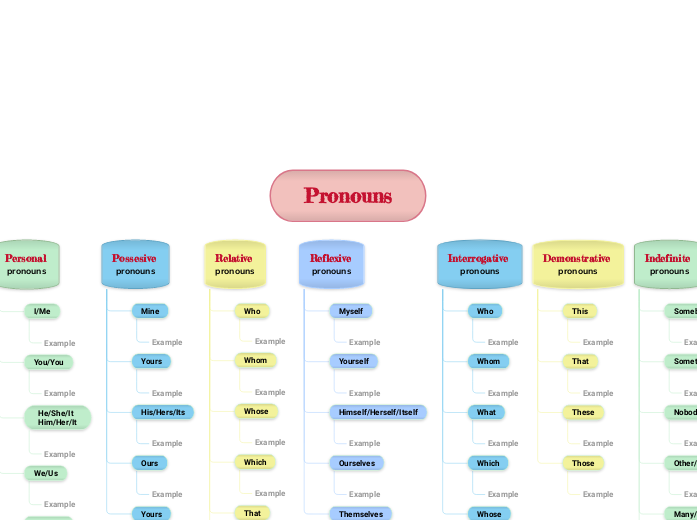English Pronouns
Use this mind map to understand how pronouns are used in different situations and practice by creating contexts.
Keywords: grammar, language


Più simili a questo
Use this template to learn the pronouns in English. Pronouns are the parts of speech used instead of nouns to avoid repetition. Depending on the situations in which they are used, they have different forms.
The types of pronouns are:
Personal pronouns
Possessive pronouns
Relative pronouns
Reflexive pronouns
Demonstrative pronouns
Interrogative pronouns
Indefinite pronouns
Personal pronouns are the pronouns that refer to specific people or things. They can change depending on the person, number, gender, or case.
Examples of personal pronouns, singular and plural form:
I/Me
You/You
He/She/It Him/Her/It
We/Us
You/You
They/Them
Possessive pronouns show that something belongs to someone.
Examples of possessive pronouns:
Mine
Yours
His/Hers/Its
Ours
Yours
Relative pronouns describe nouns in terms of how they relate to other words.
Examples of relative pronouns:
Who
Whom
Whose
Which
That
What
Reflexive pronouns are used when the subject of a sentence is also the object of the sentence.
Examples of reflexive pronouns:
Myself
Yourself
Himself/Herself/Itself
Ourselves
Themselves
Demonstrative pronouns point to and identify a noun or a pronoun. They are used in place of particular things to show which one we’re discussing.
Examples of demonstrative pronouns:
Somebody/Someone
Something/Anything
Nobody/Nothing
All
Other/Another
Both/Each
Many/Most
Some/Few
None
Such
Interrogative pronouns are the pronouns used in questions. In sentences, when the pronoun is a subject, the verb will precede the pronoun.
Examples of interrogative pronouns:
Who
Whom
What
Which
Whose
’Who’ and ‘whom’ are used to refer to people and which is used for animals and things.
Indefinite pronouns refer to a thing or person that is identifiable, but not specified.
Examples of indefinite pronouns:
This
That
These
Those
Complete the template by adding examples of phrases with these pronouns. In this way, you will retain information easier.
Pronouns - a word that can function as a noun phrase used by itself and that refers either to the participants in the discourse.
An indefinite pronoun is a pronoun that refers to a person or a thing without being specific.
Demonstrative pronouns are pronouns that point to specific objects. They function as subjects or objects.
An interrogative word or question word is a function word used to ask a question,
Reflexive pronouns are words ending in -self or -selves that are used when the subject and the object of a sentence are the same. They refer back to an earlier noun or pronoun.
A relative pronoun is a pronoun that marks a relative clause. They link one part of a sentence to another.
Possessive pronouns show that something belongs to someone. Replaces noun in phrases.
Personal pronouns are pronouns that are associated primarily with a particular grammatical person – They represents people places or things.
Write phrases as examples.
Le mappe mentali aiutano a fare brainstorming, a stabilire relazioni tra i concetti, a organizzare e generare idee.
Tuttavia, i modelli di mappe concettuali e mentali vuote offrono un modo più semplice per iniziare, in quanto sono strutture che contengono informazioni su un argomento specifico con istruzioni guida. In sostanza, i modelli di mappe mentali garantiscono la struttura che combina tutti gli elementi di un argomento specifico e servono come punto di partenza per la vostra mappa mentale personale. Sono una risorsa che fornisce una soluzione pratica per creare una mappa mentale su un particolare argomento, sia per il lavoro che per l'istruzione.
Mindomo offre modelli di mappe mentali intelligenti che consentono di lavorare e pensare senza sforzo.
Argomenti descrittivi
Argomenti con testo di sfondo
Ramo predefinito
Rimozione dei dati del modello
È possibile scegliere tra una varietà di modelli di mappe concettuali dagli account aziendali o educativi di Mindomo, oppure creare i propri modelli di mappe mentali da zero. Qualsiasi mappa mentale può essere trasformata in un modello di mappa concettuale aggiungendo ulteriori note guida a uno dei suoi argomenti.